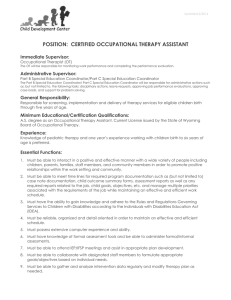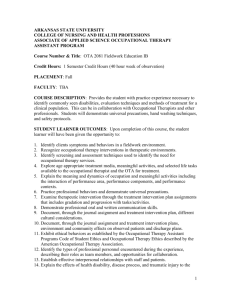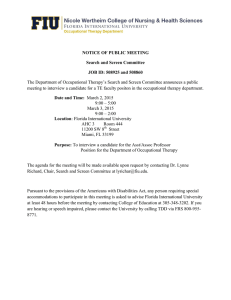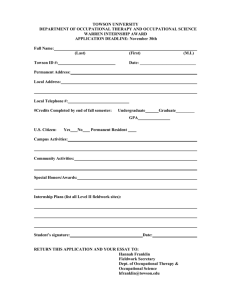Occupational Therapy Assistant Program Fall 2016 Metropolitan Community College
advertisement
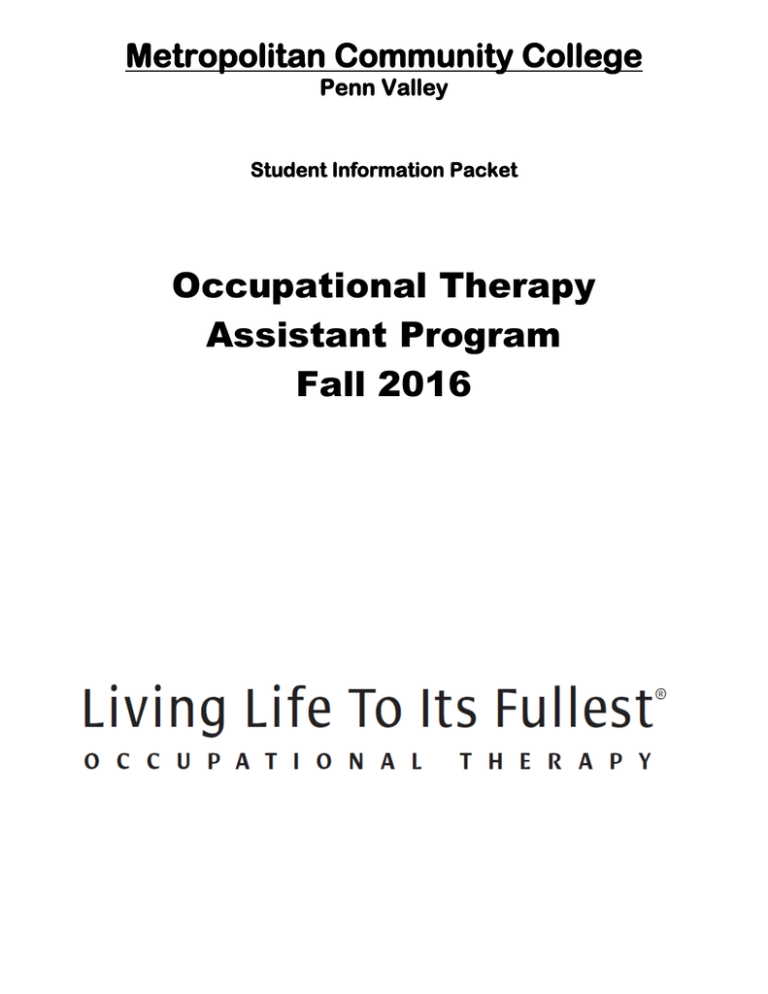
Metropolitan Community College Penn Valley Student Information Packet Occupational Therapy Assistant Program Fall 2016 Occupational Therapy Assistant Program Thank you for your interest in the Occupational Therapy Assistant Program. The Occupational Therapy Assistant Program is accredited by the Accreditation Council for Occupational Therapy Education (ACOTE) of the American Occupational Therapy Association (AOTA), located at 4720 Montgomery Lane, Suite 200, Bethesda, MD 20814-3449. AOTA's phone number is (301) 652-AOTA and the website is www.ACOTEONLINE.org. Graduates of the program will be able to sit for the national certification examination for the occupational therapy assistant administered by the National Board for Certification in Occupational Therapy (NBCOT) 800 S. Frederick Avenue, Suite 200, Gaithersburg, MD 20877-4150, (301) 9907979. After successful completion of this exam, the individual will be a Certified Occupational Therapy Assistant (COTA). Most states require licensure in order to practice; however state licenses are usually based on the results of the NBCOT Certification Examination. A felony conviction may affect a graduate’s ability to sit for the NBCOT Certification Examination or attain state licensure. The field of Occupational Therapy is exciting, diverse and rewarding. COTAs work under the supervision of a Registered Occupational Therapist to provide patient care to individuals with varying physical and/or emotional challenges to obtain their maximum level of independence with self care and daily living skills. A variety of work settings are available such as hospitals, nursing homes, school systems, home health care and community agencies. Job placement for graduates has been 100%. This packet includes all the information you will need to apply to the program. After reviewing this information, if you have more questions please call (816) 604-4235. Good luck with your educational pursuit. Occupational Therapy Assistant Program General Information Occupational Therapy as a Career: Excellent employment opportunities in a variety of settings Competitive salary, approximates $35,000 – $60,000 for new graduates Opportunity to work with people of all ages with different needs. A fulfilling profession that allows you to help others live independent and purposeful lives Occupational Therapy Assistant Program Overview: OTHA 100 is open to the public so it can be taken before or after acceptance into the program, though students who intend to apply are strongly encouraged to have 100 completed prior to application Students must apply to and be accepted to the program Accredited by the Accreditation Council of Occupational Therapy Education (ACOTE) since 1984 The program is 2 years in length, once accepted, with a total of 74 credit hours The program is full time with all classes and outside requirements occurring during daytime, weekday hours Offers 760 hours of clinical experience Excellent reputation for quality education within the healthcare community Affiliate program with Johnson County Community College and Kansas City Kansas Community College Student Requirements once accepted: Maintain CPR certification (obtained first semester of program) Complete physical exam to include TB test yearly (once accepted to program) Submit proof of required vaccinations and maintain health record Obtain Hepatitis B vaccination or sign a waiver Receive a “C” grade or better in all coursework Not have to work the last semester of school during Level II Fieldwork Purchase Liability Insurance through the college every semester Criminal Background Check (CBC): Clinical sites require that only students with an acceptable consumer report, as it relates to criminal background, be allowed to participate in clinical rotations. Therefore, prior to commencing the clinical portion of your program, MCC will have Validity Screening Solutions, a credit reporting agency, conduct a criminal background check. You are responsible for completing the required application information with the credit reporting agency and paying the cost. Criminal background checks are normally conducted once during the program, however, some clinical sites may require a more current report. MCC shall not use the results of a background check as criteria for admission to any program or course. However, you should know that you will not be able to obtain a license to practice or be allowed to participate in clinicals should you have an unacceptable background as defined by state law regarding health care providers. An unacceptable background includes a felony and/orclass "A" misdemeanor conviction Students will be required to submit to a drug screen for clinical fieldwork sites. Please see the attached statement regarding this requirement. Answers to Frequently Asked Questions: OTA coursework will not transfer to a four year institution; however some general education coursework may transfer. The OTA level does not allow you to enter a Master’s program to become an Occupational Therapist Science courses must have been taken within the last five years to be acceptable for transfer Completion of all required general education prior to starting in the OTA program would help to “lighten” the student’s load. Completion of the anatomy and physiology requirement prior to application to the program is strongly recommended. New OTA classes are only accepted once a year to begin the fall semester All prerequisites must be completed PRIOR to the application deadline on June 15 The program is full-time with classes meeting during the day most days of the week, excluding weekends. The schedule changes each semester, however classes generally start at 9:00 AM and end by 4:00 PM. Fieldwork each semester is based on the working schedule of the fieldwork educator so flexibility will be required. History or the American Institution requirement must be completed at an accredited Missouri college. This is true for all students including those attending through JCCC and KCKCC. Students who have completed History at an institution outside the state of Missouri may enroll in a one credit hour course (which will satisfy the Missouri Constitution requirement) COLL 100 or HLSC 100 is required for all students who have not already completed at least 12 college credits with at least a 2.0 GPA Students applying with previous degrees awarded still take the OTA coursework as outlined in the curriculum checklist. The program is 2 years in duration regardless of previous general education coursework taken. Occupational Therapy Assistant Program Application Process 1. The MCC admission application should be completed online at www.mcckc.edu. Select Get Started and follow the steps to apply. 2. Arrange for transcripts to be sent to MCC, Attn: Business and Registration Center, 3201 Southwest Trafficway, Kansas City, MO 64111 and also to the Occupational Therapy Assistant Program at the same address. The Student Data Center will determine course equivalencies and post them to the transcript. Include copies of high school transcripts, GED and any college transcripts for the student data center. You do not need to send high school transcripts or GED reports to the OTA program nor do you need to have an official MCC transcript sent to the program. Transcripts from colleges other than MCC do need to be sent to the OTA program as well as the student data center. Please note that it may take a few weeks for transcripts from other colleges to be sent and received. Therefore, do not wait too long to send transcripts as they may not be received by the June 15th deadline and thus affect your application status. 3. If you desire Allied Health Advising or Counseling (not required), contact an advisor at MCC by calling 816-604-1000. Johnson County Community College students can contact Melanie Roberts at 913-4698500. Kansas City Kansas Community College (KCKCC) students can contact Dr. Wendel, Dean of Allied Health at (913) 288-7126. 4. Prior to formal admission to the OTA Program complete 9 hours of course work toward the degree that must include: COLL 100 (if less than 12 credit hours already earned) ANY Biological or Physical Science worth 4 or more credits BIOL 150 Medical Terminology (2 Cr.) JCCC students take HC 130(3 Cr.) KCKCC students take ALHT 126 (2 Cr.) or 127 Medical Terminology (3 Cr.) ENGL 101 Composition & Reading (3 Cr.) JCCC students take ENGL 121 (3 Cr.) KCKCC students take ENGL 101 (3 Cr.) Highly recommend to take OTHA 100 Introduction to Occupational Therapy which is open to all students. Highly recommend if possible taking HLSC 108, Anatomy and Physiology for Health Professions prior to beginning the program instead of waiting for the first semester of the program. Applying to the OTA Program 5. Download the application packet from www.mcckc.edu/occupationaltherapy. 6. Complete 4 hours of observation in an OT setting, have the OT Practitioner you observe sign the Observation Form. Include a typed, three paged Paper about your observation experience (double spaced, 12 point font, 1-inch margins). It is up to you to locate the facility and arrange the observations. The OTA program does not maintain a list of places for prospective students. This will be evaluated for writing skills and will impact your selection for the program. Include in your paper the following: a. reaction to your observations (Do not just tell what happened in therapy during your observation but instead discuss how what you saw impacted you, your thoughts on OT and your decision to become an OTA) b. your definition of Occupational Therapy and your reasons for choosing the field. c. Your well-developed plan for managing your time while in the program. How will you juggle work, family and school if needed to ensure that your coursework and fieldwork are given full attention. 7. Fill out the Curriculum Checklist by identifying the courses you have taken and the grade you received in each course. The minimum GPA for admission is a 2.5. 8. Copy of your most current Official Transcripts (non-MCC) reflecting the courses you have taken that are relevant to your acceptance into the OTA program. Please know it can take a few weeks for colleges and universities to send transcripts and a few weeks as well for the student data center to evaluate them. (see #2) 9. The application, observation form and paper need to be placed in an envelope and sent to the Occupational Therapy Assistant Program, MCC-PV, 3444 Broadway, KCMO 64111 or dropped off to the Division Secretary at the Health Science Institute, HSI 410 at 3444 Broadway, KC, MO by June 15. 10. DO NOT include any additional materials such as letters of recommendation, essays, etc. These will not be evaluated and will not impact your selection to the program. 11. No students will be selected until after the June 15 date. Early application does not guarantee you admission to the program. Within 1-2 weeks after June 15th, you may be asked to complete an interview with program representatives. This interview will be scheduled via telephone at the programs convenience. Students may be asked to submit an on-the-spot writing sample. 12. A valid e-mail must be provided on the application as students will be informed of their status with the program via e-mail. Students can expect to learn of their acceptance or non-acceptance within 2 to 3 weeks after June 15th. 13. Students accepted into the OTA Program will be invited to an orientation and fall enrollment session in July. Do not try to enroll in any course prior to this orientation session. 14. At the orientation session, students will review the Occupational Therapy Assistant Program Recommendations/Policies, sign this document and possibly submit a writing sample. Applicant selection is based on: Past and present academic performance, at least 2.5 GPA Volunteer and work experience Written communication abilities Possible Interview This college does not discriminate on the basis of race, color, national origin, sex, age or disability in admission or access to or treatment of employment in its programs and activities-MCC provides a range of services to allow persons with disabilities to participate in the educational programs and activities. If you need an accommodation due to a disability under the Americans with Disabilities Act and Section 504 of the Rehabilitation Act, please contact Disability Support Services (DSS) Coordinator, 604-4293. Advance notice may be necessary for some accommodations to be provided in a timely manner. Accommodations must be supported by adequate documentation and are determined on an individualized basis. Approximate Fees and Expenses (Subject to change) Based on a total of 74 credit hours: See http://www.mcckc.edu/tuition for up to date information and to see the districts In-District Tuition Out of District Tuition Out of State Tuition Books Supplies Document management Criminal Background Check And FCSR Drug screen Allied Health fee (for OTHA courses only) $95.00 per credit hour $175.00 per credit hour $229.00 per credit hour Total Total $35.00 $63.00 Total for program $ 7030.00 $12,950.00 $16,946.00 $8,00+ $200.00+ $35.00 $ 63.00 (subject to change) $32-$33 1 time $20/credit hour $32-$33 $1000.00 Financial Aid and Scholarships are available contact the Financial Aid Office for more information at 816-6041000. A Summary of Your Rights under the Fair Credit Reporting Act Metropolitan Community College Criminal Background Checks (CBCs) for Allied Health, Nursing and Continuing Education Programs Student Application Packet: Criminal Background Check (CBC): Clinical sites require that only students with an acceptable consumer report, as it relates to criminal background, be allowed to participate in clinical rotations. Therefore, prior to commencing the clinical portion of your program, Metropolitan Community College (MCC) will have Validity Screening Solutions, a credit reporting agency, conduct a background check. You are responsible for completing the required application information with the credit reporting agency and paying the cost. Criminal background checks are normally conducted once during the program, however, some clinical sites may require a more current report. MCC shall not use the results of a background check as criteria for admission to any program or course. However, you should know that you will not be able to obtain a license to practice or be allowed to participate in clinicals should you have an unacceptable background as defined by state law regarding health care providers. An unacceptable background includes a felony and/or class "A" misdemeanor conviction. Drug-Free Workplace, Campus and Community Drug Screen Policy MCC – Penn Valley is committed to maintaining high standards in all programs including allied health and nursing education and practice. Safe practice includes efficient, reliable, and unimpaired student performance at all times including in the classroom and in a clinical setting. Being under the influence of drugs or alcohol poses serious safety and health risks not only to the user but also to all persons who come in contact with the user. Students are required to perform all education related activities in appropriate mental and physical condition MCC-PV has adopted the Federal Drug-Free Workplace Act of 1988 and Drug-Free Schools and Communities Act Amendments of 1989. The policy is one of zero tolerance. Together with the college’s Drug-Free policy, the Code of Student Conduct imposes prohibited conduct and possible disciplinary action. If in violation of these policies, students subject themselves to disciplinary actions up to and including suspension or expulsion from the college and its programs. Clinical facilities are committed to providing a safe environment in order to protect its patients, residents, employees and visitors; to provide the highest level of service; and to minimize the potential for accidents and injuries. Therefore, many of the clinical contracts between MCC – PV and hospitals, clinics, and other facilities have a component requiring drug screening for allied health and/or nursing students. The clinical site might require that an MCC – PV allied health and/or nursing student complete and pass a drug screen prior to being admitted into the facility as a student. Additionally, some clinical facilities require random drug testing during the duration of a clinical rotation. Refusal to submit to a drug screen or testing positive can make a student ineligible to participate in clinical training. The cost for a drug screen may be covered by the clinical facility. If not, the student is responsible for the cost. METROPOLITAN COMMUNITY COLLEGE – PENN VALLEY OCCUPATIONAL THERAPY ASSISTANT PROGRAM PERFORMANCE STANDARDS FOR OCCUPATIONAL THERAPY ASSISTANT STUDENTS Student Responsibilities: Occupational Therapy Assistants work under the supervision of an Occupational Therapist, helping people with physical, cognitive, social or emotional problems reach maximum independence in daily living skills. OTAs work in a variety of settings: hospitals, schools, out-patient clinics, mental health clinics as well as community agencies and businesses. During your academic experience, you'll be exposed to a very hands-on and interactive learning environment that is both supportive and challenging. Your education also includes fieldwork at varying facilities which will involve direct client contact and involvement with community professionals. Student should consider this responsibility both an opportunity and a requirement. Students are expected to follow the code of student behavior set by the College and to conduct themselves in a professional, ethical, and responsible manner with other students, faculty, administrators, all program and College facilities, community professionals and clients, equipment, and supplies. Performance Standards for Successful Completion of the Occupational Therapy Assistant Program: These Performance Standards should be used to assist each applicant and student to determine if they are otherwise qualified to be an Occupational Therapy Assistant. It is the policy of MCC – Penn Valley to provide reasonable accommodations for individuals with disabilities. If you need an accommodation due to a disability under the Americans with Disabilities Act, please contact the Access Resource Coordinator at 816-759-4089 or visit the MCC website at www.mcckc.edu/access.html. Two to six week advance notice is required for some accommodations. Upon completion of the Associate of Applied Science degree in Occupational Therapy Assistant, the graduate will be able to meet the following standards: ABILITY Mobility STANDARD Ability sufficient to assist clients to move from room to room, move over varied terrain, and provide safe and effective client care in a timely fashion. Fine Motor Skills Fine motor abilities sufficient to provide safe and effective patient care in a timely fashion. Hearing Auditory ability sufficient to monitor and assess health needs of clients for safe client care. Visual Sufficient observation skills necessary for safe client care. Critical Thinking Critical thinking sufficient for clinical judgment. SOME EXAMPLES OF NECESSARY ACTIVITIES Assist adults and children with transfers to/from a variety of surfaces and provide proper positioning for the clients independently and safely. Transport adults and children in wheelchairs. Transport and set up intervention and therapeutic equipment such as swings, balls, splint pans, prostheses, tub seats, portable commodes, etc. Physically support clients engaging in treatment safely during treatment sessions. Use instruments such as goniometers and strength gauges, safety devices, adaptive equipment in the care/treatment of clients Construction of splints, adaptive equipment, as needed Detect and respond independently to monitoring alarms, signs of client’s distress such as a change in an client’s pulse, blood pressure and/or a client’s communication of distress Detect and respond independently to warning signals from team members and/or clients of impending danger or emergency, i.e. a change in an individual’s appearance, and/or an individual’s physical communication of distress. Interpret and carry-out written and verbal communication often in stressful situations. Identify cause-effect relationship to develop appropriate and safe intervention strategies following the OTR plan of care. Determine when assistance from an OTR is needed Interpersonal Skill Interpersonal abilities sufficient to interact with clients, families, groups, team members from a variety of social, emotional, cultural, and intellectual backgrounds. Communication Communication abilities for interaction with others orally and in writing Establish rapport and maintain professional boundaries in relationships with clients/families and colleagues. Motivate and engage clients in treatment. Ability to resolve conflict and to respond to feedback in a professional manner Respond appropriately and effectively with psychotic behavior and/or threatening inappropriate or aggressive behavior that maybe exhibited by clients. Accurately present therapy findings/results/plan to clients/families and in team meetings. Instruct client/family in OT treatment procedures. Accurately document client progress notes, reports according to facility guidelines and standards.

